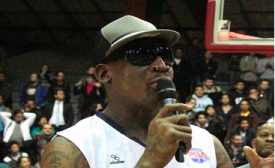media
The Internet, and particularly left-leaning U.S. blogs, are abuzz with a story in the Mexican newspaper El Universal alleging that the United States cut secret deals with one of Mexico's largest drug cartels. The nature of those deals change based on which English-language rewrite you're reading, but in the most extreme and widely circulated tellings, the U.S. allowed the Sinaloa cartel to "smuggle billions of dollars of drugs" and granted the organization "immunity and undisturbed drug trafficking" in exchange for information on rival cartels.
On behalf of the Broadcasting Board of Governors, which oversees civilian U.S. international media worldwide, BBG Chair Jeffrey Shell today issued the following statement regarding the Russian government’s refusal of a visa for David Satter.
Sports diplomacy is often presented as a slam dunk approach for building relations across political divides. Last week veteran NBA star Dennis Rodman took a shot at “basketball diplomacy” in North Korea and showed how professed good intentions can go afoul.
African politics took on a humourous angle as Twitter users joked about their countries' affairs using high school analogies. The hashtag #AfricanNationsInHighSchool quickly went viral as Africans online weighed in with perceptions of their own nations and their neighbours, referencing everything from common stereotypes to current affairs. Mentions of the hashtag skyrocketed to nearly 50,000 uses in less than 24 hours.

Sports diplomacy is often presented as a slam dunk approach for building relations across political divides. Last week veteran NBA star Dennis Rodman took a shot at “basketball diplomacy” in North Korea and showed how professed good intentions can go afoul. It also demonstrated the deft role of the media as the tables turned on the NBA players following a confrontational interview between Rodman and CNN New Day anchor Chris Cuomo. The NBA players not only lost control of the ball but became the ball on CNN’s court.
What’s a U.S. ambassador to do when he wants to get his message out in a country that enjoys making America look bad, has little patience for Western values and tightly controls the media? Call him @McFaul, the tweeting ambassador. For Ambassador Michael McFaul, the unfiltered communication offered by social media means he can tweet U.S. policy, blog it and post it on Facebook, an alternative to the mostly hostile traditional media here.
Global media in public diplomacy has increasingly proved its usefulness in recent years. Many governments have competitively engaged in a war of public diplomacy through media to make their countries look attractive and friendly to foreigners while also setting the stage for others to understand their positions in the international arena. The success or failure of public diplomacy through media, however, can only be judged by its intended audience.
Almost as soon as a Russian court convicted activist Alexei Navalny of embezzlement, on highly dubious grounds, in July 2013, U.S. Ambassador Michael McFaul tweeted his disappointment at the “apparent political motivations in this trial.” Within minutes that comment echoed across Russia’s social media landscape, eventually generating nearly 1,000 retweets and getting picked up by numerous media outlets.







